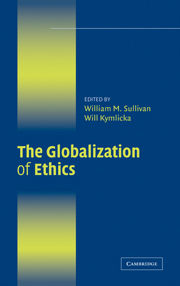Book contents
- Frontmatter
- Contents
- Contributors
- Acknowledgments
- 1 Introduction: The Globalization of Ethics
- 2 Global Ethics and the International Law Tradition
- 3 Morality and Universality in Jewish Thought
- 4 Globalization and Christian Ethics
- 5 Buddhism and the Globalization of Ethics
- 6 Muslim Perspectives on Global Ethics
- 7 Confucianism: Ethical Uniformity and Diversity
- 8 Natural Law, Common Morality, and Particularity
- 9 Liberalism and the Globalization of Ethics
- 10 Feminist Perspectives on a Planetary Ethic
- 11 Ethical Universalism and Particularism: A Comparison of Outlooks
- Appendix: Key Documents on Global Ethics
- Bibliography
- Index
2 - Global Ethics and the International Law Tradition
Published online by Cambridge University Press: 03 September 2009
- Frontmatter
- Contents
- Contributors
- Acknowledgments
- 1 Introduction: The Globalization of Ethics
- 2 Global Ethics and the International Law Tradition
- 3 Morality and Universality in Jewish Thought
- 4 Globalization and Christian Ethics
- 5 Buddhism and the Globalization of Ethics
- 6 Muslim Perspectives on Global Ethics
- 7 Confucianism: Ethical Uniformity and Diversity
- 8 Natural Law, Common Morality, and Particularity
- 9 Liberalism and the Globalization of Ethics
- 10 Feminist Perspectives on a Planetary Ethic
- 11 Ethical Universalism and Particularism: A Comparison of Outlooks
- Appendix: Key Documents on Global Ethics
- Bibliography
- Index
Summary
Is a universal ethic, one extending to all corners of the planet, a worthy aspiration? The international law tradition responds summarily: A planetary ethic is the very point of the tradition. That is, the international law tradition is dedicated to extending to the entire globe a set of commitments to which states give their active assent – through covenants, charters, conventions, declarations, treaties, and even customary law governing war, commerce, human rights, refugees, the environment, the making of treaties, membership in international organizations, and many other affairs. The tradition is dedicated to widening this ethic so that more and more states make such commitments. It is dedicated to deepening this ethic so that among the states that have signed on, an ever-increasing proportion of their leaders and citizens come to accept international law as legitimate, not simply as a set of norms to be endorsed for instrumental purposes. And the tradition is committed to broadening this ethic, so that more numerous categories of people and attributes come under the law's protection.
Although many of the traditions in this volume also propound a universal ethic – and some more than others – these others focus far more on justifications for claims about truth, goodness, justice, and the general character of law and institutions, and relatively less on creating, spreading, and defining the practice of legal norms.
- Type
- Chapter
- Information
- The Globalization of EthicsReligious and Secular Perspectives, pp. 17 - 37Publisher: Cambridge University PressPrint publication year: 2007
- 3
- Cited by



